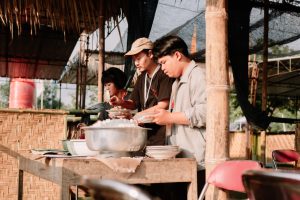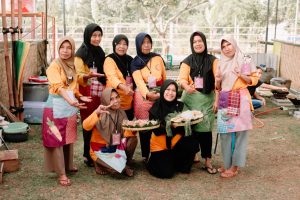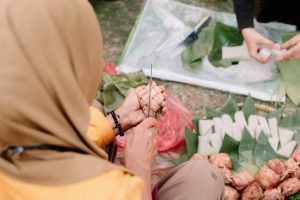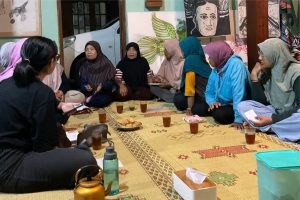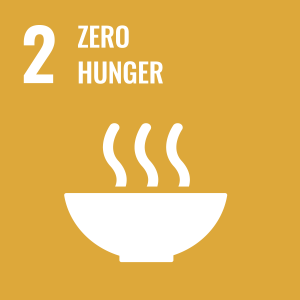
Logandeng, October 18, 2025 — Isradina Paricha, a student from the Master’s Program in Performing Art and Visual Arts Studies (PSPSR) at Universitas Gadjah Mada, participated as the Program Coordinator for Pawon Hajat Khasiat: Dapur Penuh Rasa Solidaritas (A Kitchen Brimming with the Spirit of Solidarity). This activity constituted one of the main programs of the Yogyakarta Cultural Festival (FKY) 2025, held in Logandeng, Playen, Gunungkidul, from October 11–18, 2025. Isradina, alongside Fajar Riyanto as the Programmer, managed an open kitchen that engaged groups of mothers from Logandeng Village, the local youth organization (karang taruna), Women Farmers’ Groups (KWT), and local communities with an interest in food and cultural issues.
Pawon Hajat Khasiat: Dapur Penuh Rasa SOlidaritas facilitated a warm, safe, and inclusive meeting space. The kitchen not only served as a logistical support space for the festival but also as a social and cultural foundation for dialogue, encounters, and the exchange of meaning. Through the activities of cooking, sharing food, and conversation, the kitchen became a medium for forging relationships between the festival organizers and the community.
This program featured mothers from Logandeng Village and Ngalang KWT as primary collaborators. They did not merely cook for the committee but also played an active role in sharing stories, introducing local food traditions, and practicing the local wisdom of Gunungkidul in every dish. Daily activities, such as Caos Dhahar—a midday banquet inviting community members to bring and describe their regional culinary specialties—and the kenduri (communal feast) held in the evening, became concrete manifestations of solidarity, gratitude to nature, and an appreciation for the life-nurturing work undertaken by the mothers.
The engagement of PSPSR students in this program was not limited to practical fieldwork but also constituted part of a cross-disciplinary learning experience encompassing art, society, and cultural policy. Through this program, students learned to manage art as a participatory space, respect the community’s social rhythms, and understand that cultural work emerges from solidarity and reciprocal relationships, rather than domination or unilateral instruction. This dynamic also reinforces the scholarly orientation of PSPSR UGM, which positions the study of art as both a reflective and socially engaged practice.
More than merely a cooking space, the kitchen in this program functioned as a metaphor for solidarity and sustainability. It became a space where participants put into practice the values of collective work, social justice, and the daily preservation of local culture. Consequently, Pawon Hajat Khasiat not only delivered flavor but also cultivated a critical awareness of the importance of a culture that champions communal life.
The engagement of PSPSR UGM students in Pawon Hajat Khasiat: Dapur Penuh Rasa Solidaritas directly reflects the values of the Sustainable Development Goals (SDGs), particularly in establishing equitable partnerships among academics, the community, and cultural practitioners. Through this collaborative practice, students functioned not only as facilitators but also as social learners engaged in the dynamics of community life.
This activity embodies Goal 2: Zero Hunger by highlighting local food security and kitchen practices as a space for sharing both food and knowledge about sustainable food sources. Furthermore, the engagement of mothers from the Women Farmers’ Group (KWT) and Logandeng Village affirms Goal 5: Gender Equality, positioning women as central agents of knowledge, guardians of food traditions, and active partners with students in an intergenerational learning process. This collaboration also embodies Goal 11: Sustainable Cities and Communities, as it strengthens the bond between the university and the community through inclusive and sustainable cultural practices. Through mutually respectful interactions, PSPSR students learned to understand culture not merely as an object of study, but as a living sphere continuously reinvigorated by its community. This entire process serves as a concrete example of Goal 17: Partnerships for the Goals. The relationship between students, mothers, and the community was not hierarchical; rather, it was built on solidarity, mutual learning, and respect for local knowledge. Thus, the engagement of PSPSR students in Pawon Hajat Khasiat was not merely a cultural practice but also a manifestation of their commitment to collective-based sustainable development. (IP)

